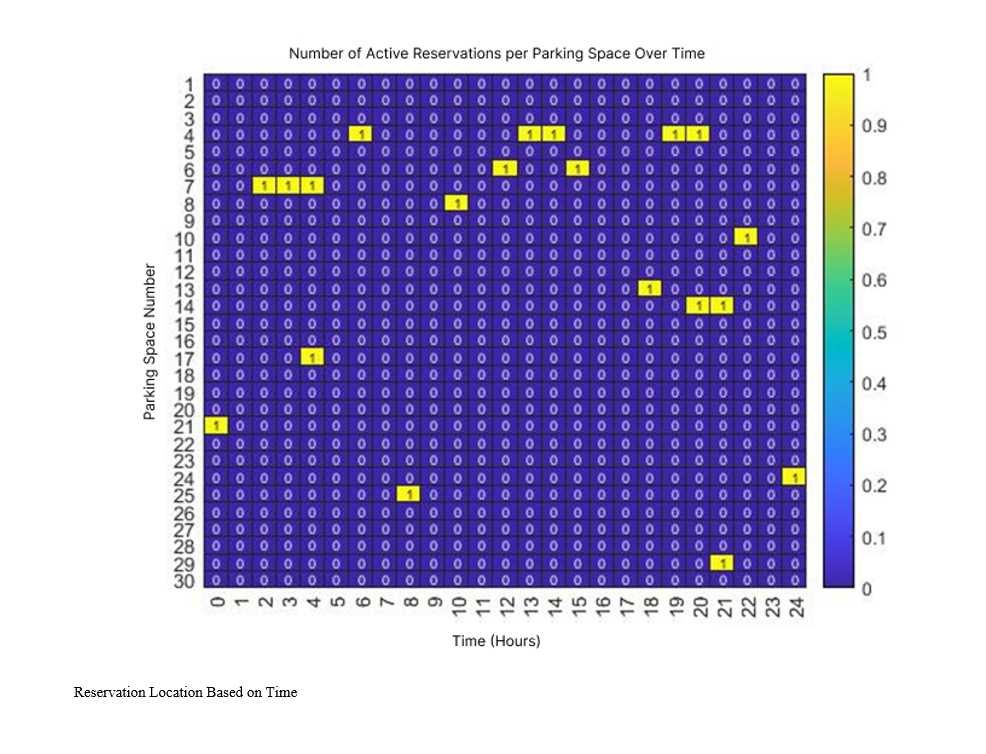Multi-Criteria Modeling for Smart Parking and Parking Reservation
Keywords:
Smart Parking, Parking Capacity, Parking Reservation, Markov ChainAbstract
In the realm of smart cities, issues related to vehicle parking have increasingly contributed to traffic congestion, primarily due to drivers searching for vacant spots and the inefficient management by parking operators. Therefore, smart parking systems must continuously be enhanced with real-time models that can reflect the availability of parking spaces and improve the utilization of parking capacity, thereby addressing part of these challenges. This paper proposes a two-stage hybrid approach aimed at optimizing parking space reservations in smart parking systems. The model enables drivers to locate the most time-efficient parking spot within these systems. In the first stage, the parking space is evaluated within an environment defined by fixed capacity. In the second stage, the most suitable parking spot is made available through a hierarchical parking management system using a search-based method. The approach is grounded in Markov Chain modeling, which is employed to accurately estimate the number of vehicles requiring reservations. Underestimation of this figure results in insufficient demand adjustments, whereas overestimation leads to additional operational costs. Therefore, the proposed system uses Markov Chains for capacity forecasting and mathematical models to simulate the temporal movement of vehicles within the parking facility to determine the proportion of reserved versus regular parking spaces. This temporal analysis improves reservation predictions and yields an average occupancy rate of approximately 0.032, with 15 successful reservations recorded over a 24-hour period.
References
H. Zulfiqar, H. M. U. Haque, F. Tariq, and R. M. Khan, "A survey on smart parking systems in urban cities," (in English), Whily, 2021, doi: 10.1002/cpe.6511.
K. Sundaramoorthy, A. Singh, G. Sumathy, A. Maheshwari, A. R. Arunarani, and S. Boopathi, A Study on AI and Blockchain-Powered Smart Parking Models for Urban Mobility. IGI Global Scientific PublishingDO - 10.4018/978-1-6684-9999-3.ch010 (in English), 2024.
S. K. Singh, Y. Pan, and J. H. Park, "Blockchain-enabled Secure Framework for Energy-Efficient Smart Parking in Sustainable City Environment," Sustainable Cities and SocietyLA - English, 2022.
S. K. Singh, Y. Pan, and J. H. Park, "Blockchain-enabled Secure Framework for Energy-Efficient Smart Parking in Sustainable City Environment," (in English), Sustainable Cities and Society, 2022.
X. Wang, M. Xu, H. Xiao, and Q. Yang, "A Two-Stage Reservation and Allocation Approach for Smart Parking System Considering Parking Unpunctuality," (in English), 2025, doi: 10.2139/ssrn.5142692.
S. L. Tilahun and G. Di Marzo Serugendo, "Cooperative Multiagent System for Parking Availability Prediction Based on Time Varying Dynamic Markov Chains," (in English), wiley, 2017, doi: 10.1155/2017/1760842.
S. Kumar and R. Y. Udaykumar, "Development of Markov Chain-Based Queuing Model and Wireless Infrastructure for EV to Smart Meter Communication in V2G," (in English), De Gruyter, 2015, doi: 10.1515/ijeeps-2014-0176.
N. Sakib, M. Bakibillah, S. Susilawati, M. A. S. Kamal, and K. Yamada, "Eco-Friendly Smart Car Parking Management System with Enhanced Sustainability," (in English), MDPI, 2024, doi: 10.3390/su16104145.
V. Rajyalakshmi and K. Lakshmanna, "Detection of car parking space by using Hybrid Deep DenseNet Optimization algorithm," (in English), Wiley Online Library, 2023, doi: 10.1002/nem.2228.
R. Kaur, R. K. Roul, and S. Batra, "A hybrid deep learning CNN-ELM approach for parking space detection in Smart Cities," (in English), Neural Computing and Applications, 2023.
S. Sinharage, M. Dassanayake, A. Bakibillah, and C. Jayawardena, "PARKING SPACE OPTIMIZATION USING MONTE CARLO SIMULATION: CASE STUDY AT THE UNIVERSITY OF MORATUWA," 2024.
G. Icarte-Ahumada, Z. He, V. Godoy, F. García, and M. Oyarzún, "A Multi-Agent System for Parking Allocation: An Approach to Allocate Parking Spaces," (in English), Electronics, 2025, doi: 10.3390/electronics14050840.
Z. Mei, H. Zhang, W. Tang, and L. Zhang, "Assessment and optimization of parking reservation strategy for Park-and-Ride system emissions reduction," (in English), Transportation Research Part D: Transport and Environment, 2023.
Y. Han and R. Peng, "Reserved Parking Space Allocation with Maximizing Social Welfare," 2023.
S. Y. Siddiqui, M. A. Khan, S. Abbas, and F. Khan, "Smart occupancy detection for road traffic parking using deep extreme learning machine," (in English), Computer and Information Sciences, 2022, doi: 10.1016/j.jksuci.2020.01.016.
A. Fahima, M. Hasan, and M. A. Chowdhurya, "Smart parking systems: comprehensive review based on various aspects," (in English), HELIYON, 2021, doi: 10.1016/j.heliyon.2021.e07050.
L. F. Macea, I. Serrano, and C. Carcache-Guas, "A reservation," 2023.
S. Chandrasekaran, J. M. Reginald, W. Wang, and T. Zhu, "Computer Vision Based Parking Optimization System," 2022.

Downloads
Published
Submitted
Revised
Accepted
Issue
Section
License
Copyright (c) 2025 Sajjad Baghal Aghdampour (Author)

This work is licensed under a Creative Commons Attribution-NonCommercial 4.0 International License.











